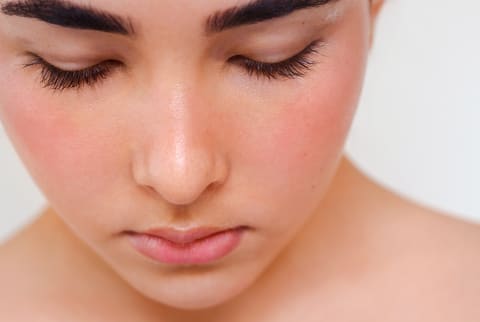Advertisement
3 Surprising Rosacea Triggers You Probably Never Suspected From A Derm


Like most skin conditions, rosacea is complicated and complex. And flare-ups can show up at any given moment, seemingly without rhyme or reason. So if you wake up with bumps and texture changes—or experience flushing as the day goes on, you may be racking your brain to figure out what caused it. (For what it's worth, this is why dermatologists and estheticians always encourage you to keep a skin journal so you can better identify what's happening with your skin at any given moment.)
Well, in this week's episode of Clean Beauty School, I did a deep dive into the condition with board-certified dermatologist Estee Williams, M.D. In the episode we discuss the wide variety of causes and triggers—if you have rosacea or experience flushing, tune in to get a better understanding of what might be your skin's tipping point. Here, three very surprising triggers and causes of rosacea:
Hormonal changes
The hormone-skin connection is a deep one. Cortisol, the stress hormone, notoriously breaks down collagen. Melatonin, the hormone released in sleep, aids in skin repair and rejuvenation. Estrogen, progesterone, and testosterone, common sex-associated hormones, can influence a wide variety of skin attributes.
While there's still much to learn about the ways hormones influence rosacea, according to Williams the connection is unmistakable. "When we look at the demographics of rosacea—you know, more women in their midlife decades—you can't ignore the connection with hormones and hormonal changes," she says. "Although it hasn't been as well defined, we know that there's a hormonal component to rosacea. And this is why patients with rosacea tend to report flares during pregnancy or during perimenopause, for example." Or if you experience periods, you may see changes fluctuating depending on what stage of the cycle you are in.
The skin microbiome
The skin microbiome is an essential part of the skin's function and makeup, providing a wide range of roles from reducing oxidative stress to keeping skin hydrated and calm. Thus an imbalance in the skin microbiome can certainly cause skin concerns—rosacea being a prime example.
"It's thought that there is an abundance of Demodex mites, which is a tiny mite found on everyone's skin but in slightly greater numbers in rosacea patients," she says, noting more research is needed in this area (as the microbiome research is still relatively young across the board). "All these little microbes living on us—whether they're bacteria or fungi or in this case, mites—are constantly playing a part in skin function, whether that's in normal skin or in disease states. It's just a matter of us figuring out what exactly is going on."
Foods—even the "healthy ones"
Your diet does not cause rosacea; however, what you eat can influence how well it is managed. Specifically, some foods can trigger flare-ups, both anecdotally and via research. And unfortunately, the list is long.
"The National Rosacea Society came up with the list of many triggers that were commonly reported by rosacea patients, and foods were off the charts," she says, noting items like coffee, tea, red wine, avocados, citruses, nuts, spinach, soy, and spicy herbs. "It's a very long list, so it would be unmanageable to avoid everything on it—especially because many of these are healthy foods. It's not just cookies and cake."
Rather, she says, if you can identify a few that give you particular issues—just be mindful of their effects and don't consume them in excess.